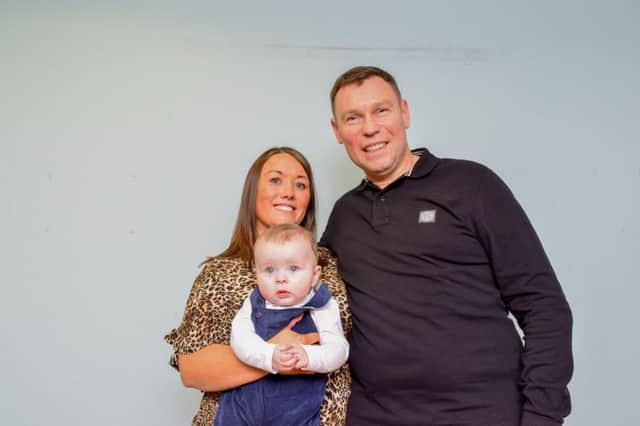Christmas joy with Scotland's first '˜heart in a box' transplants


Roger Marr, from Prestonpans, East Lothian, and Julie-Ann Morris from Glasgow received the transplants earlier this year involving the world’s first portable system which keeps human organs warm and functioning outside of the body.
The new technology simulates the conditions of the human body and allows organs to function as they normally do.
Advertisement
Hide AdAdvertisement
Hide AdThe Organ Care System (OCS) extends the amount of time a donated organ can remain outside the body in a condition suitable for transplantation, while giving surgeons the opportunity to assess an organ’s function.
Previously the critical time was four hours for a heart kept in a cool-box with ice but with the new system hearts can be assessed for around ten hours, which also widens the distance from destination from the donor to the hospital.
Mr Marr, 46, an assistant rail construction manager for Network Rail, who was the first patient to receive the treatment, said it meant he would now be able to see his baby son, Rocco, now five months old, grow up.
“I had been to my GP who said it was bad flu and to just go home and take paracetamol. But I was aching all over and could hardly move. My wife Caroline was wanting us to go round the relatives to let them know she was pregnant but I told her I was staying in my bed.
“Then I went to accident and emergency at the Edinburgh Royal Infirmary on a Sunday morning, November 2017,and the consultant there told me it was more than he could deal with and that I was being sent for treatment. I asked him when that would be and he said ‘now, there’s an ambulance at the door, you’re going for treatment right now.’
“I went in the clothes I stood up in and wasn’t back home for four-and-a-half months.”
Mr Marr was diagnosed with having a viral infection, which eventually caused severe heart failure and told he was seriously ill and needed a heart transplant to survive.
“I was very, very lucky the way things turned out for me. It has changed me dramatically. It has made me appreciate life a lot more, I’m doing more things with my family, but most of all it will be seeing my son brought up,” Mr Marr said.
Advertisement
Hide AdAdvertisement
Hide Ad“I owe so much to the donor, their family and transplant team at the Jubilee, I cannot put into words my gratitude or how I feel. They saved my life and gave me a life with my newborn son, who is now running me ragged.”
“I’m feeling really good now. I’m in the gym, training for 25 minutes without stopping, doing 12 miles, squats with 70-80kg weights, I feel absolutely brilliant. The cardio rehab in Edinburgh can’t believe my progress and say I’m six to eight weeks more advanced than other patients, so I don’t know if that has anything to do with the Heart in a Box.”
Mr Marr added: “We’re going to have a big family dinner with us all together at Christmas, a celebration with my family and friends who were just amazing helping us through it.
“My mum died in April 2017 and with all that was going on with myself last Christmas was very sad. This time it’s going to be different because of the hospital and the medical team who saved my life.”
Phil Curry, transplant surgeon at the Golden Jubilee National Hospital in Clydebank, West Dunbartonshire, where the operations took place, said: “It is a fantastic achievement to have completed two heart transplants this year using the Organ Care System – for the first time in Scotland - with good results for the patients involved. Roger and Julie-Ann are both young and were critically ill, but they are now making good progress and I have little doubt that using the OCS helped keep the donors’ hearts in premium condition before transplantation. The OCS means that organs can be retrieved from farther away and that we can therefore consider organs which may have been previously rejected.
“Using new technologies that can benefit patients and improve outcomes for them is a major part of what we do and how we work at the Golden Jubilee Foundation, to lead on quality, research and innovation.”
Instead of the traditional ‘ice box’ method, ‘Heart in a Box’ continually provides the donor organ with glucose, oxygen and blood – doubling the amount of time a heart is viable for transplant.
The donor heart is placed in a clear chamber the size of a large lunchbox.